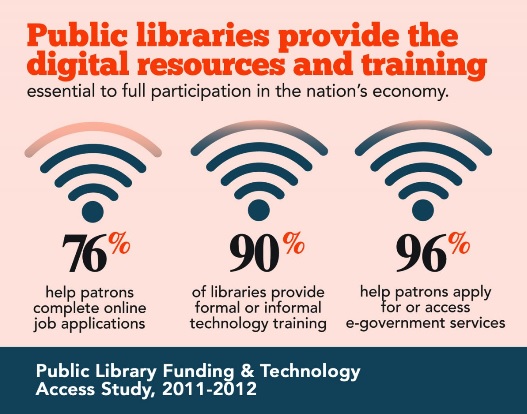
“Be it helping residents continue their educations, find jobs, improve their career skills, access e-government services, research health information, or connect with family and friends, libraries play an essential role in helping local government meet their greatest challenges by connecting their services to critical community priorities. Partnering with the American Library Association and the University of Maryland on the Digital Inclusion project will help bring greater understanding and awareness of the role of libraries on the critical issue of digital inclusion.” Bob O’Neill, ICMA Executive Director.
Access to the Internet is essential for success in education, employment, workforce development, finance, health, e-government and civic engagement. However, according to the Pew Home Broadband 2013, 30% of families don’t have access to the Internet in their homes. To meet the needs of those left behind, digitally inclusive communities bring together access, information, and literacy to provide residents with the skills to succeed in the communities in which they live, work, and play.
According to the University of Maryland’s Information Policy & Access Center (iPAC) issue briefs:
- Millions of job-seekers use public library services to find job openings, work on resumes, and complete online applications.
- Public libraries provide an essential link between government and citizens. As government information, services, and resources become digital – in many cases, digital only – public libraries serve as critical community gateways to electronic government.
- Public libraries provide free access to workstations and Internet services to those who could not otherwise access these resources.
- Public libraries also provide training and assistance to those who lack technology skills or who have difficulty using Internet services.
The Digital Inclusion Survey allows communities to take the pulse of their ability to support the access, digital literacy, economic and workforce development, civic engagement, educational support, and health information needs of their residents. Interact with community-level data to:
- Identify community impacts afforded through access to public computers and the Internet.
- Identify opportunities to help solve community needs.
- Demonstrate their digital inclusion efforts and learn from others.
Click here to learn how to become a digitally inclusive community and leverage resources to meet your strategic priorities.
New, Reduced Membership Dues
A new, reduced dues rate is available for CAOs/ACAOs, along with additional discounts for those in smaller communities, has been implemented. Learn more and be sure to join or renew today!
